This Week in Freethought History (May 6-12)
Here’s your Week in Freethought History: This is more than just a calendar of events or mini-biographies – it’s an affirmation that we as freethinkers are neither unique nor alone in the world, no matter how isolated and alone we may feel at times.
 Last Sunday was the 51st birthday of American actor and director George Clooney (1961). The nephew of the singer and actress Rosemary Clooney (1928-2002), he is also the cousin of actor Miguel Ferrer (b. 1955). Clooney was profiled in the Washington Post in 1997 and told writer Sharon Waxman, “I don't believe in Heaven and Hell. I don't know if I believe in God. All I know is that as an individual, I won't allow this life – the only thing I know to exist – to be wasted.”
Last Sunday was the 51st birthday of American actor and director George Clooney (1961). The nephew of the singer and actress Rosemary Clooney (1928-2002), he is also the cousin of actor Miguel Ferrer (b. 1955). Clooney was profiled in the Washington Post in 1997 and told writer Sharon Waxman, “I don't believe in Heaven and Hell. I don't know if I believe in God. All I know is that as an individual, I won't allow this life – the only thing I know to exist – to be wasted.”
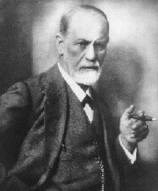 Last Sunday May 6, but 156 years ago, the Viennese psychoanalyst – and much-caricatured icon of psychoanalysis – Sigmund Freud was born (1856). Freud founded modern psychoanalysis and guided the systematic study of neuroses out of the supernatural realm of demon-possession and into the science of physical causes of mental maladies. And Freud turned the old theory on its head, considering religion the disease rather than the cure of mental problems. In 1927, Freud wrote, “Religion ... comprises a system of wishful illusions together with a disavowal of reality, such as we find in an isolated form nowhere else but in amnesia, in a state of blissful hallucinatory confusion.” In a letter to Charles Singer, Freud wrote, “Neither in my private life nor in my writings, have I ever made a secret of being an out-and-out unbeliever.”
Last Sunday May 6, but 156 years ago, the Viennese psychoanalyst – and much-caricatured icon of psychoanalysis – Sigmund Freud was born (1856). Freud founded modern psychoanalysis and guided the systematic study of neuroses out of the supernatural realm of demon-possession and into the science of physical causes of mental maladies. And Freud turned the old theory on its head, considering religion the disease rather than the cure of mental problems. In 1927, Freud wrote, “Religion ... comprises a system of wishful illusions together with a disavowal of reality, such as we find in an isolated form nowhere else but in amnesia, in a state of blissful hallucinatory confusion.” In a letter to Charles Singer, Freud wrote, “Neither in my private life nor in my writings, have I ever made a secret of being an out-and-out unbeliever.”
Last Monday, May 7, brought us birthdays of four famous Freethinkers—
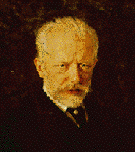 It was on May 7, 172 years ago, that composer Peter Ilyich Tchaikovsky (Пётр Ильи́ч Чайко́вский) was born (1840). Though he composed sacred as well as secular music, Tchaikovsky was a secret Freethinker. In a letter to his brother Modest, he wrote that he had been reading Gustave Flaubert’s Madame Bovary and remarked, “I think there is no more sympathetic personality in all the work of literature. A hero and martyr to his art. And so wise! I have found some astonishing answers to my questionings as to God and religion in his book.” Flaubert was an Atheist.
It was on May 7, 172 years ago, that composer Peter Ilyich Tchaikovsky (Пётр Ильи́ч Чайко́вский) was born (1840). Though he composed sacred as well as secular music, Tchaikovsky was a secret Freethinker. In a letter to his brother Modest, he wrote that he had been reading Gustave Flaubert’s Madame Bovary and remarked, “I think there is no more sympathetic personality in all the work of literature. A hero and martyr to his art. And so wise! I have found some astonishing answers to my questionings as to God and religion in his book.” Flaubert was an Atheist.
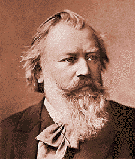 It was on May 7, 179 years ago, that German composer Johannes Brahms was born (1833). Brahms also was equally adept at composing sacred and secular music. And he was an apostate from Christianity. His letters to his friend Heinrich von Herzogenberg (1843-1900), who was likewise a Freethinker, show that Brahms was an agnostic. The lyrics of the first of his Four Serious Songs express his disbelief in personal immortality: “For that which befalleth the sons of men befalleth beasts, as the one dieth, so dieth the other. All go unto one place; all are of the dust and all turn to dust again. Who knoweth the spirit of man that goeth upward, and the spirit of the beast that goeth downward to the earth?”
It was on May 7, 179 years ago, that German composer Johannes Brahms was born (1833). Brahms also was equally adept at composing sacred and secular music. And he was an apostate from Christianity. His letters to his friend Heinrich von Herzogenberg (1843-1900), who was likewise a Freethinker, show that Brahms was an agnostic. The lyrics of the first of his Four Serious Songs express his disbelief in personal immortality: “For that which befalleth the sons of men befalleth beasts, as the one dieth, so dieth the other. All go unto one place; all are of the dust and all turn to dust again. Who knoweth the spirit of man that goeth upward, and the spirit of the beast that goeth downward to the earth?”
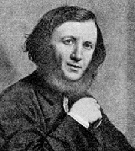 Last Monday was the 200th anniversary of the birth of English poet Robert Browning (1812). A well educated man from a wealthy family, Browning was able to emancipate himself from Christian belief by the time he was 18, although he remained a Theist. “Who knows most,” said Browning, “doubts most.” And, 34 years later, in a poem called “Gold Hair,” he wrote, “The candid incline to surmise of late / that the Christian faith may be false, I find.” His writings speak much of God, but Browning himself admitted, “I am no Christian.”
Last Monday was the 200th anniversary of the birth of English poet Robert Browning (1812). A well educated man from a wealthy family, Browning was able to emancipate himself from Christian belief by the time he was 18, although he remained a Theist. “Who knows most,” said Browning, “doubts most.” And, 34 years later, in a poem called “Gold Hair,” he wrote, “The candid incline to surmise of late / that the Christian faith may be false, I find.” His writings speak much of God, but Browning himself admitted, “I am no Christian.”
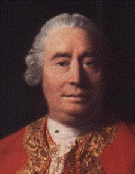 And born on May 7, 301 years ago, was the Scottish philosopher and historian David Hume (1711). Hume professed a belief in God. However, when he applied the scientific method to determining how knowledge is acquired, and formulated the theory that all knowledge is subjective, he pretty much undercut the basis for even Deism. In his Natural History of Religion, he wrote, “Examine the religious principles which have, in fact, prevailed in the world, and you will scarcely be persuaded that they are anything but sick men’s dreams.” Hume was friends with Adam Smith and James Boswell. It was Boswell who attended him as Hume lay dying in 1776 and, hoping to convert him at last, was frustrated when Hume said flatly that “the morality of every religion was bad” and that “when he heard a man was religious, he concluded that he was a rascal.”
And born on May 7, 301 years ago, was the Scottish philosopher and historian David Hume (1711). Hume professed a belief in God. However, when he applied the scientific method to determining how knowledge is acquired, and formulated the theory that all knowledge is subjective, he pretty much undercut the basis for even Deism. In his Natural History of Religion, he wrote, “Examine the religious principles which have, in fact, prevailed in the world, and you will scarcely be persuaded that they are anything but sick men’s dreams.” Hume was friends with Adam Smith and James Boswell. It was Boswell who attended him as Hume lay dying in 1776 and, hoping to convert him at last, was frustrated when Hume said flatly that “the morality of every religion was bad” and that “when he heard a man was religious, he concluded that he was a rascal.”
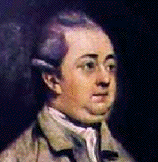 It was 275 years ago last Tuesday, May 8, that English historian and MP Edward Gibbon was born (1737). His father died in 1770, leaving Gibbon enough money to begin writing the first volume of his masterwork, The History of the Decline and Fall of the Roman Empire, which appeared in 1776-1788. It was Gibbon’s aim to elevate history above “the register of the crimes, follies and misfortunes of mankind,” and to wrest the study of the past from clerical confines. He outraged the clerics of his time by describing Christianity as a factor that hastened the decay of Ancient Rome. Gibbon wrote, “… the church and even the state were distracted by religious factions, whose conflicts were sometimes bloody and always implacable; the attention of the emperors was diverted from camps to synods; the Roman world was oppressed by a new species of tyranny, and the persecuted sects became the secret enemies of their country.” Although Gibbon is accused of Atheism and of bias against religion, in his master work he is more charitable toward Christianity than it deserves.
It was 275 years ago last Tuesday, May 8, that English historian and MP Edward Gibbon was born (1737). His father died in 1770, leaving Gibbon enough money to begin writing the first volume of his masterwork, The History of the Decline and Fall of the Roman Empire, which appeared in 1776-1788. It was Gibbon’s aim to elevate history above “the register of the crimes, follies and misfortunes of mankind,” and to wrest the study of the past from clerical confines. He outraged the clerics of his time by describing Christianity as a factor that hastened the decay of Ancient Rome. Gibbon wrote, “… the church and even the state were distracted by religious factions, whose conflicts were sometimes bloody and always implacable; the attention of the emperors was diverted from camps to synods; the Roman world was oppressed by a new species of tyranny, and the persecuted sects became the secret enemies of their country.” Although Gibbon is accused of Atheism and of bias against religion, in his master work he is more charitable toward Christianity than it deserves.
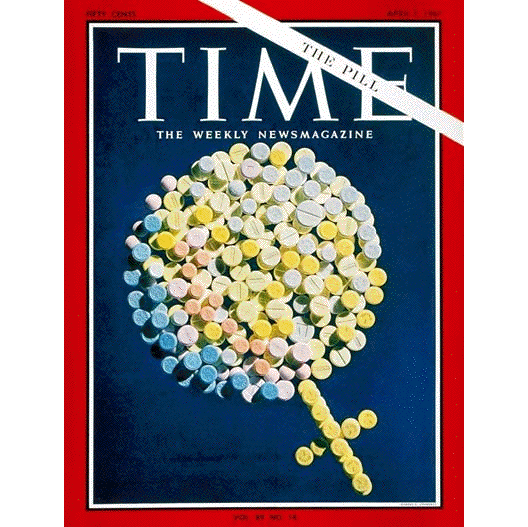 It was 52 years ago last Wednesday, May 9, that the US Food and Drug Administration approved the first oral contraceptive for women (1960). The effect on sexual freedom for women, a freedom until that time enjoyed only by men, was astonishing. The pill was envisioned by legendary birth control crusader Margaret Sanger. Sanger was in her 80s in 1953 when she met with Roman Catholic Dr. Gregory Pincus (1903-1967). She gave him $150,000 and tasked him to research and develop an oral contraceptive for women that was safe and effective. In defiance of his church, and amid much negative publicity for attempting to thwart God’s will – a will Sanger once described as “biological slavery” – Dr. Pincus succeeded. The reaction of the churches was predictably punitive. The reaction of the Catholic Church in particular was to cobble together reasons why “artificial” forms of birth control were bad and “natural” birth control – also known as death – was good. The result, an encyclical from Pope Paul VI in 1968, known as Humanae Vitae (Human Life), was a masterpiece of mendacity and slippery scholarship. In fact, the modern world, with its longer lives, survival of women through their childbearing years and material prosperity, is only possible through such “artificial” impositions on God’s plan: The contraceptive pill, and that other artificial stuff humans created are all that stand between a humane habitation of planet Earth and devastation by overpopulation.
It was 52 years ago last Wednesday, May 9, that the US Food and Drug Administration approved the first oral contraceptive for women (1960). The effect on sexual freedom for women, a freedom until that time enjoyed only by men, was astonishing. The pill was envisioned by legendary birth control crusader Margaret Sanger. Sanger was in her 80s in 1953 when she met with Roman Catholic Dr. Gregory Pincus (1903-1967). She gave him $150,000 and tasked him to research and develop an oral contraceptive for women that was safe and effective. In defiance of his church, and amid much negative publicity for attempting to thwart God’s will – a will Sanger once described as “biological slavery” – Dr. Pincus succeeded. The reaction of the churches was predictably punitive. The reaction of the Catholic Church in particular was to cobble together reasons why “artificial” forms of birth control were bad and “natural” birth control – also known as death – was good. The result, an encyclical from Pope Paul VI in 1968, known as Humanae Vitae (Human Life), was a masterpiece of mendacity and slippery scholarship. In fact, the modern world, with its longer lives, survival of women through their childbearing years and material prosperity, is only possible through such “artificial” impositions on God’s plan: The contraceptive pill, and that other artificial stuff humans created are all that stand between a humane habitation of planet Earth and devastation by overpopulation.
 Last Thursday, May 10, was the 79th anniversary in Berlin that about 20,000 anti-Nazi, Jewish-authored books were burned during a student rally as the Nazis rose to power in Germany (1933). This particular suppression of free speech and ideas was a tactic of Joseph Goebbels’ Ministry of Propaganda. But the burning of books, often culminating in the burning of people (as Heinrich Heine famously observed), is an old idea. Chinese Emperor Qin Shi Huang (秦始皇) – who created and then buried the famous Terra Cotta Warriors in Xi’an, China – before he died in 210 BCE, ordered the burning of most extant books. Just to be sure, he had the leading scholars executed, too. In Christendom, John Calvin was probably the most efficient when, in 1600, he burned Michael Servetus at the stake for heresy, and “around his waist were tied a large bundle of manuscripts and a thick octavo printed book.” In early March 2001, about 200 right-wing Hindus burned Korans in New Delhi. In May 1981 Sinhalese police officers burned the second largest library in Asia, in northern Sri Lanka, destroying 97,000 books. The largest single act of book burning in modern history took place in August 1992, when the Oriental Institute in Sarajevo was attacked by Serb nationalist forces, who immolated the National and University Library of Bosnia, destroying a priceless collection of over 1.5 million volumes. But it’s the same old story as when the Nazis burned books on this date 79 years ago: “We know better than you do what’s best for you to read.”
Last Thursday, May 10, was the 79th anniversary in Berlin that about 20,000 anti-Nazi, Jewish-authored books were burned during a student rally as the Nazis rose to power in Germany (1933). This particular suppression of free speech and ideas was a tactic of Joseph Goebbels’ Ministry of Propaganda. But the burning of books, often culminating in the burning of people (as Heinrich Heine famously observed), is an old idea. Chinese Emperor Qin Shi Huang (秦始皇) – who created and then buried the famous Terra Cotta Warriors in Xi’an, China – before he died in 210 BCE, ordered the burning of most extant books. Just to be sure, he had the leading scholars executed, too. In Christendom, John Calvin was probably the most efficient when, in 1600, he burned Michael Servetus at the stake for heresy, and “around his waist were tied a large bundle of manuscripts and a thick octavo printed book.” In early March 2001, about 200 right-wing Hindus burned Korans in New Delhi. In May 1981 Sinhalese police officers burned the second largest library in Asia, in northern Sri Lanka, destroying 97,000 books. The largest single act of book burning in modern history took place in August 1992, when the Oriental Institute in Sarajevo was attacked by Serb nationalist forces, who immolated the National and University Library of Bosnia, destroying a priceless collection of over 1.5 million volumes. But it’s the same old story as when the Nazis burned books on this date 79 years ago: “We know better than you do what’s best for you to read.”
Last Friday, May 11 was the birthday of two famous Freethinkers—
 It was on May 11, 94 years ago, that American Nobel-laureate physicist Richard P. Feynman was born (1918). In 1965, along with two other scientists, Feynman won the Nobel Prize in Physics for expanding the understanding of quantum electrodynamics. In his spare time he translated Mayan hieroglyphics – what were left after Bishop Diego de Landa destroyed most of them in 1562. After the Challenger disaster of January 28, 1986, Feynman reluctantly joined the Rogers Commission which led to the finding that faulty O-rings were the principle cause of the shuttle explosion that killed seven astronauts. It was Richard Feynman who once said, “God was invented to explain mystery. God is always invented to explain those things that you do not understand. Now, when you finally discover how something works, you get some laws which you’re taking away from God; you don’t need him anymore. … God is always associated with those things that you do not understand.”
It was on May 11, 94 years ago, that American Nobel-laureate physicist Richard P. Feynman was born (1918). In 1965, along with two other scientists, Feynman won the Nobel Prize in Physics for expanding the understanding of quantum electrodynamics. In his spare time he translated Mayan hieroglyphics – what were left after Bishop Diego de Landa destroyed most of them in 1562. After the Challenger disaster of January 28, 1986, Feynman reluctantly joined the Rogers Commission which led to the finding that faulty O-rings were the principle cause of the shuttle explosion that killed seven astronauts. It was Richard Feynman who once said, “God was invented to explain mystery. God is always invented to explain those things that you do not understand. Now, when you finally discover how something works, you get some laws which you’re taking away from God; you don’t need him anymore. … God is always associated with those things that you do not understand.”
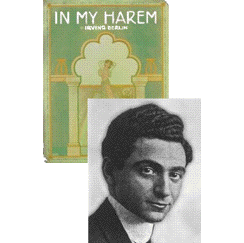 Also on May 11, but 124 years ago, the American songwriter who gave us “White Christmas” and “God Bless America,” Irving Berlin, was born (1888). He emigrated from Russia at the age of five and spent his next 95 years becoming one of the most celebrated film and stage songwriters in US history. In her biography of her father, daughter Mary Ellin Barrett refers to her father’s “agnosticism,” and describes him as a “nonbeliever.” Irving Berlin follows a long tradition of freethinkers who used the religious vocabulary familiar to the majority.
Also on May 11, but 124 years ago, the American songwriter who gave us “White Christmas” and “God Bless America,” Irving Berlin, was born (1888). He emigrated from Russia at the age of five and spent his next 95 years becoming one of the most celebrated film and stage songwriters in US history. In her biography of her father, daughter Mary Ellin Barrett refers to her father’s “agnosticism,” and describes him as a “nonbeliever.” Irving Berlin follows a long tradition of freethinkers who used the religious vocabulary familiar to the majority.
Today, May 12, brings us the birthdays of three more famous Freethinkers—
 It was 75 years ago today that American stand-up comedy Hall of Famer George Carlin was born (1937). Carlin minced no words about his Atheism, as he said in 1999:
It was 75 years ago today that American stand-up comedy Hall of Famer George Carlin was born (1937). Carlin minced no words about his Atheism, as he said in 1999:
When it comes to bullshit, big-time, major league bullshit, you have to stand in awe of the all-time champion of false promises and exaggerated claims, religion. No contest. Religion has actually convinced people that there’s an invisible man living in the sky who watches everything you do, every minute of every day. And the invisible man has a special list of ten things he does not want you to do. And if you do any of these ten things, he has a special place, full of fire and smoke and burning and torture and anguish, where he will send you to live and suffer and burn and choke and scream and cry forever and ever ’til the end of time! But He loves you. And He needs money!”
Notable as a social critic, after his inspiration, Lenny Bruce, Carlin’s “Seven Dirty Words” routine brought about the 1978 U.S. Supreme Court case F.C.C. v. Pacifica Foundation, in which the Court affirmed the government’s power to abridge free speech on the public airwaves when it includes “indecent” material. George Carlin summed up his feeling about Christianity by saying, “I would never want to be a member of a group whose symbol was a guy nailed to two pieces of wood.”
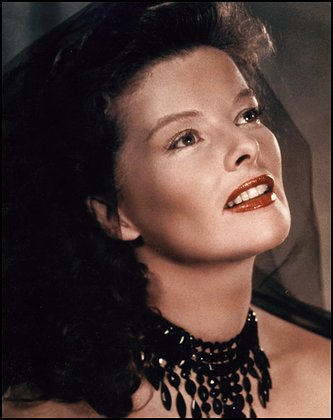 It was also 105 years ago today that the First Lady of Cinema, Katharine Hepburn, was born (1907). She was the daughter of a doctor and a suffragette, both of whom always encouraged her to speak her mind and develop it fully. Hepburn distinguished herself in strong leading-lady roles. From Morning Glory in 1933, which won her her first Oscar – to On Golden Pond in 1981, which won her her fourth Oscar, Hepburn was considered a national treasure. “I’m an atheist, and that’s it,” Hepburn told the Ladies’ Home Journal in 1991. “I believe there’s nothing we can know except that we should be kind to each other and do what we can for each other.” And, as for religion in politics, said Katharine Hepburn, “Our Constitution was not intended to be used by … any group to foist its personal religious beliefs on the rest of us.”
It was also 105 years ago today that the First Lady of Cinema, Katharine Hepburn, was born (1907). She was the daughter of a doctor and a suffragette, both of whom always encouraged her to speak her mind and develop it fully. Hepburn distinguished herself in strong leading-lady roles. From Morning Glory in 1933, which won her her first Oscar – to On Golden Pond in 1981, which won her her fourth Oscar, Hepburn was considered a national treasure. “I’m an atheist, and that’s it,” Hepburn told the Ladies’ Home Journal in 1991. “I believe there’s nothing we can know except that we should be kind to each other and do what we can for each other.” And, as for religion in politics, said Katharine Hepburn, “Our Constitution was not intended to be used by … any group to foist its personal religious beliefs on the rest of us.”
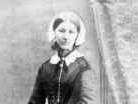 And it was 192 years ago today that English nurse Florence Nightingale was born (1820). Her father believed women should get an education, so Nightingale learned Italian, Latin, Greek, history, and mathematics. During the Crimean War she used her mathematics training to invent a statistical model to plot the incidence of preventable deaths in the military, developing the “polar-area diagram” to dramatize the needless deaths caused by unsanitary conditions. “Were there none who were discontented with what they have,” said Nightingale, “the world would never reach anything better.” Few who know of her life realize that she despised the churches and was an advanced Freethinker. “I am so glad that my God is not the God of the High Church or of the Low,” said Nightingale, “that he is not a Romanist or an Anglican – or a Unitarian.” For most of her ninety years, Florence Nightingale pushed for reform of the British military health-care system and brought increased respect to the nursing profession.
And it was 192 years ago today that English nurse Florence Nightingale was born (1820). Her father believed women should get an education, so Nightingale learned Italian, Latin, Greek, history, and mathematics. During the Crimean War she used her mathematics training to invent a statistical model to plot the incidence of preventable deaths in the military, developing the “polar-area diagram” to dramatize the needless deaths caused by unsanitary conditions. “Were there none who were discontented with what they have,” said Nightingale, “the world would never reach anything better.” Few who know of her life realize that she despised the churches and was an advanced Freethinker. “I am so glad that my God is not the God of the High Church or of the Low,” said Nightingale, “that he is not a Romanist or an Anglican – or a Unitarian.” For most of her ninety years, Florence Nightingale pushed for reform of the British military health-care system and brought increased respect to the nursing profession.
We can look back, but the Golden Age of Freethought is now. You can find full versions of these pages in Freethought history at the links in the American Heathen blog, which take you to my blog, FreethoughtAlmanac.com.

